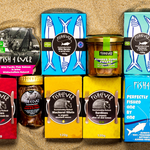You have no items in your shopping cart.
We’re extremely proud of our “better than” net zero policy. We’ve gone into exhaustive detail and research to make sure we are correct on the issues and we’ve come up with an excellent and highly commendable policy. This isn’t idle boasting because we know as well that what we can do is almost literally meaningless in the bigger scheme of things, a mere a drop in the ocean. However, if every small 10-person company was where we are today, then the world would already be in a much better place.

For many years we’ve felt the climate crisis was above and beyond us, that we were too insignificant to matter, that it was all way above our pay grade and that we were already doing quite a lot of work - mostly unpaid, unrecognised and vigorously opposed by the powers that be – in trying to be a really good company selling great products.
Anybody who has been running a small food business, from the great crash and banking crisis in 2008, through Brexit and Covid, with unequal competition and a rapidly changing market-place will sympathise with the idea that just trying to make it through the day deserves a medal at least equal to the Victoria Cross! It’s in fact rare for any small business in any part of the economy to be interested and engaged in ethics but at Organico our modus operandi is to represent and be best practise. And so, it became an increasingly glaring omission to have no position - except a shrug of a shoulder - on the biggest environmental question of the age.
Here’s an outline summary of what we mean with our “better than” net zero policy.
1. We start with low carbon products: vegan, vegetarian, fish. 80% of agricultural emission are meat, dairy and rice. Agricultural emissions are at around 24% of total emissions, up to maybe 30% depending upon the source/reference you find.
2. We start with low waste products: long life, conserved from harvest, using produce from field or sea when it is “plentiful” and/or in season, and no graded selection + no refrigerated transport or storage. NB: 1/3 rd of global food is wasted – that’s a huge carbon waste.
3. We benchmarked ourselves against industry standard and against a roadmap produced by the British Retail Consortium for retailers like Tesco, Asda, Ikea, etc. We are streets ahead of the objectives and targets in this roadmap.
4. We are 100% organic and sustainable it’s not just about carbon, it’s about biodiversity, soil health, water purity and quality, nature eco-system services. More widely United Nations Sustainable Development Goals unite economic and social justice and the environment: this is the definition of sustainability our company has always adopted and recognised.
We are also “better than” because the total investment we are making in climate change mitigation and offsets far exceeds our footprint.
However, we do recognise that carbon once emitted cannot be returned, it is already released, and that the world is over-reliant on offsets to negate those emissions. In the end the truth is we are not in control of our product emissions: these are dependent on government action to decarbonise the energy supply and electricity grid.
Because we don’t own factories, transport, land or machinery directly ourselves, we can’t take action at that level so it makes sense to financially back the green energy transition and put our money where our mouth is:
5. We’re committing to invest in 100% renewable energy generation by buying shares and/or bonds every year from 2020 to 2030. Our Financial Year end is September and we have already bought £100k of shares. At a guestimate, this already covers about 1/8 th of our current emissions and we reckon with wider de-carbonisation of the energy supply, we will reach 100% by 2030.
6. We’ve reduced our own direct footprint. We’ve bought solar panels for our office roof, battery storage and switched to LED bulbs. We’ll also be aiming to travel as wisely as possible and will double offset our flights to put a voluntary tax on ourselves which governments should have put in place a while back.
Next comes offsetting. Offsetting has a bad reputation in some quarters but - apart from avoiding some obvious pitfalls and recognising that offsets by themselves are entirely insufficient - offsets do provide real value and a balancing of emissions can be achieved. We decided against certified carbon credits not because we don’t trust the certifications, although we are aware of criticism but mainly because the cost of certification is so onerous that it means you are paying far too much for the process and not enough into the offset. Ethical Consumer recommend going bespoke on offsets and we liked the idea of supporting relevant charities we had checked out ourselves rather than choose a menu of projects off a website.
7. We’re committing to plant 1⁄2 million trees in the next 5 years. Trees measurable remove Co2 and will be doing so in the critical period of the next 20-30 years. We’ve chosen to invest in tropical forest because it is a) where the biggest current degradation in forest coverage is happening, b) the CO2 impact of tropical planting is far greater than planting trees in other temperatures and c) it is far cheaper than planting trees elsewhere. Given we are in a real climate crisis paying less for more trees makes a lot of sense.
Our tree investment alone far exceeds our Co2 emissions and is not going to be reduced as we buy more renewable shares. Eden Reforestation Projects, our chosen partner, supports biodiverse forestry, much of it in high carbon sequestering mangroves. The charity helps with poverty alleviation by employing local workers, seeds its own trees and respects local communities and indigenous people. We’ve put an “equivalent to verifiable” rule in our tree pledge by promising to invest in trees at least as much as it would cost us to pay for certified carbon credits. Finally with no Co2 equivalent calculation, we are:
8. Supporting climate-related charitable work. We hope to invest an equivalent amount to our tree spend on climate change related actions. First supporting regenerative agriculture with Ecosystem Restoration Camps, which works on restoring degraded land. Second supporting the Environmental Justice Foundation and their work with Climate Refugees.
We will keep our eyes on the issue, engage with suppliers in a co-operative and non-aggressive manner, integrate Co2 values into our accounting and inventory systems and both promote and opt for climate-friendly solutions whenever we can.
Our Charity Partners

Energy Transition Shares














